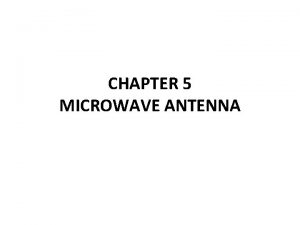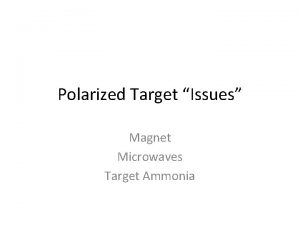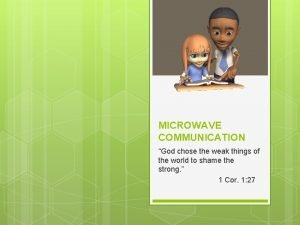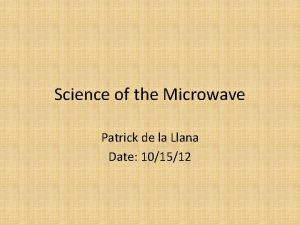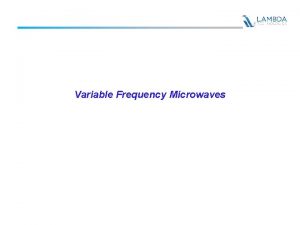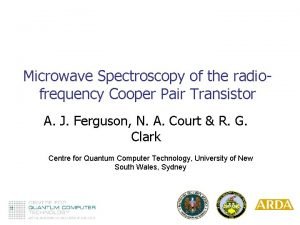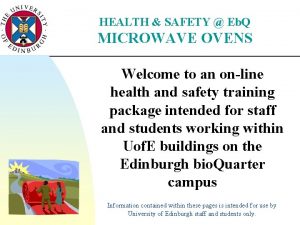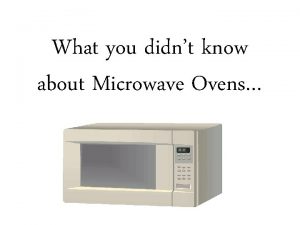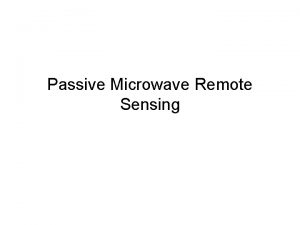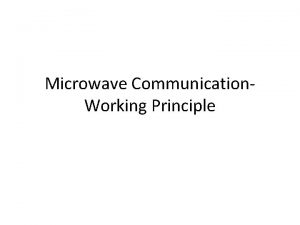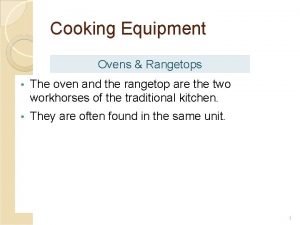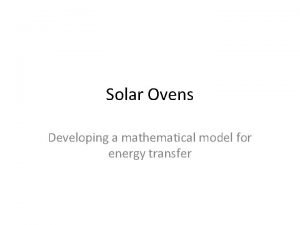Microwave Ovens 1 Microwave Ovens Microwave Ovens 2















- Slides: 15

Microwave Ovens 1 Microwave Ovens

Microwave Ovens 2 Introductory Question n If you put a CD in a microwave oven, it will A. do nothing. burn up the microwave oven. burn up the CD. B. C.

Microwave Ovens 3 Observations About Microwaves Microwave ovens cook food from inside out n They can cook foods unevenly n They don’t defrost foods well n You shouldn’t put metal inside them? ! n Do they make food radioactive or toxic? n

Microwave Ovens 4 3 Questions about Microwave Ovens Why do microwaves cook food? n How does metal respond to microwaves? n How does the oven create its microwaves? n

Microwave Ovens 5 Question 1 n Why do microwaves cook food?

Microwave Ovens 6 Electromagnetic Spectrum Long-wavelength EM waves: Radio & Microwave n Medium-wavelength: IR, Visible, UV light n Short-wavelength: X-rays & Gamma-rays n

Microwave Ovens 7 Water Molecules Water molecules are unusually polar n An electric field orients water molecules n A fluctuating electric field causes water molecules to fluctuate in orientation n

Microwave Ovens 8 Microwave Heating Microwaves have fluctuating electric fields n Water molecules orient back and forth n Liquid water heats due to molecular “friction” n Ice doesn’t heat due to orientational stiffness n Steam doesn’t heat due to lack of “friction” n Food’s liquid water content heats the food n

Microwave Ovens 9 Interference Identical waves that overlap can interfere n Interference is when the fields add or cancel n Adding fields are constructive interference n Canceling fields are destructive interference n Reflects cause interference in a microwave n Interference causes uneven cooking n Good microwaves “stir” waves or move food n

Microwave Ovens 10 Question 2 n How does metal respond to microwaves?

Microwave Ovens 11 Effects of Microwaves n Non-Conductors: Polarization Mobile, polar molecules orient and heat n Immobile, polar molecules do nothing much n Non-polar molecules do nothing much n n Conductors: Current flow Good, thick conductors reflect microwaves n Poor conductors experience resistive heating n Thin conductors experience resistive heating n

Microwave Ovens 12 Introductory Question (revisited) n If you put a CD in a microwave oven, it will A. do nothing. burn up the microwave oven. burn up the CD. B. C.

Microwave Ovens 13 Question 3 n How does the oven create its microwaves?

Microwave Ovens 14 Generating Microwaves Magnetron tube has tank circuits in it n Streams of electrons amplify tank oscillations n A loop of wire extracts energy from tanks n A short ¼-wave antenna emits the microwaves n

Microwave Ovens 15 Summary about Microwave Ovens They cook food because of its water content n Polar water molecules heat in microwave fields n Thin or sharp metals overheat or spark n The microwaves are produced by a magnetron. S n
 Ovens national school
Ovens national school Energy star commercial fryers
Energy star commercial fryers Transformations
Transformations Microwave antenna definition
Microwave antenna definition Questron microwave digestion system
Questron microwave digestion system Microwave at target
Microwave at target Microwave alignment tool
Microwave alignment tool Microwave food preservation
Microwave food preservation Fresnel clearance formula
Fresnel clearance formula M type tubes
M type tubes Percy spencer the inventor of the microwave oven igcse
Percy spencer the inventor of the microwave oven igcse Frequency of a microwave
Frequency of a microwave Spectrum of electromagnetic waves
Spectrum of electromagnetic waves Microwave spectroscopy definition
Microwave spectroscopy definition Microwave uses radiation
Microwave uses radiation Microwave assisted extraction
Microwave assisted extraction



